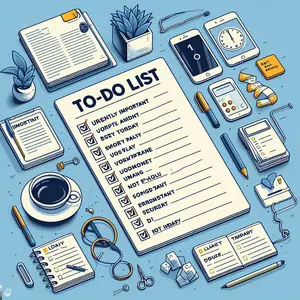0 Comments // Reading Time: 10 min.

Everyday working life – a constant dance with time. Appointments, tasks, deadlines – sometimes it's hard to keep track of everything. But don't worry, you're not alone. This blog article is your personal compass for better time planning in everyday working life.
Here, we'll dive into the world of effective time planning together to find ways to not only get more done, but to do so with less stress and more happiness at work. Let's explore together how you can structure your workday, set priorities and develop strategies to face your daily challenges with a smile.
The importance of effective time planning in everyday working life
Everyday working life can sometimes seem like a raging storm – constant meetings, appointments, deadlines. But with effective time planning, the storm can be turned into an easily navigable sea voyage.
Why is this important?
The importance of effective time planning in everyday working life is multifaceted and affects various aspects of your professional life. Here are some key aspects.
-
Increased productivity: Smart time planning allows you to organize more tasks into efficient time blocks, increasing your productivity. This allows you to get more done in less time.
-
Stress reduction: Structured time planning helps you to organize your working day better, which reduces your stress levels. Clearly defined goals and priorities prevent you from feeling overwhelmed.
-
Better focus: Conscious planning of time blocks and the use of time management techniques promote and improve your concentration on the respective tasks. Which improves the quality of your work.
-
Achieving goals: Effective time planning helps you to focus on the important tasks that contribute to achieving long-term goals. This creates a clear path for professional success.
-
Self-management: Time planning promotes your self-management by giving you more control over your own working day. You can reflect on and improve your individual work habits.
-
Efficient use of resources: Time is a precious resource. Good time planning ensures that you invest time and energy in the activities that bring you the greatest added value.
-
Improved communication: Transparent planning of tasks and time frames promotes more effective communication within the team. Everyone involved has clear expectations and knows when to expect results.
Overall, the importance of scheduling in your day-to-day work is to create structure and efficiency in order to achieve both your professional and personal goals.
The basics of time planning
Before we dive into the depths of time planning, let's first take a look at the basics of time planning in everyday working life. Your work habits and clear goals are like a map for a successful path through your day. This is where we take the first step towards structured time planning.
The basics of a structured working day form the solid foundation on which efficient work is built. Here are some key aspects.
-
Self-reflection and goal setting: A structured working day starts with a clear understanding of your own work habits and goals. Reflect on your strengths and weaknesses in order to work specifically on improving them.
-
Clear priorities: Identifying important and urgent tasks is crucial. Clear prioritization allows you to focus on the tasks that have the greatest impact on your goals.
-
Delegation/Outsourcing: Recognize which tasks you can delegate in order to work more efficiently. Effective communication plays a crucial role here to ensure that delegation is successful.
-
Dealing with interruptions: Strategies for minimizing distractions and responding effectively to unforeseen events will help maintain the flow of work.
-
Regular review and adaptation: The continuous review of time planning and the adaptation of strategies based on experience and changes in day-to-day work are crucial for long-term success.
These foundations form the building blocks for a well-structured working day that is not only efficient, but also creates space for personal development and well-being.
Optimize to-do lists

To-do lists are your everyday work companions, but not all are created equal. We will discuss how you can create an effective list. A well-structured to-do list helps you to keep an overview and work through tasks systematically. The list should be realistic and highlight important tasks. Optimizing your to-do list can help you navigate through your day more efficiently and purposefully. Here are some tips on how you can improve your to-do list.
-
Set priorities: Divide your tasks into urgent, important and less important. Focus on the important and urgent tasks first to ensure that the essential things get done.
-
Realistic goals: Be honest with yourself about what you can realistically achieve in a day. Set clear and achievable goals to avoid overwhelm and frustration.
-
Create categories: Group similar tasks into categories. This not only makes organization easier, but also allows you to complete tasks faster because you are in a certain thinking mode.
-
Delegate tasks: Check whether there are tasks that you can delegate. Not everything has to be on your shoulders. Delegate where possible to reduce the burden.
-
Important decisions first: If possible, try to tackle the most important or difficult tasks at the beginning of the day when your energy and concentration are at their highest.
-
Daily check: Take time at the end of the day to review your to-do list. What have you achieved? What is still outstanding? This allows you to plan better for the next day.
-
Use technology: There are many digital tools and apps for the to-do list. Find one that suits your working style. Some offer reminders, categories and even team collaboration.
-
Maintain flexibility: Be flexible and ready to make adjustments. Sometimes priorities change or unforeseen events occur. A flexible to-do list makes it easier for you to react to changes.
-
Establish a reward system: Reward yourself when you complete certain milestones or tasks. This can increase motivation and provide you with a positive incentive.
By integrating these tips into your to-do list, you can not only increase your efficiency, but also gain better control over your tasks and your working day.
Breaks and opportunities to relax
Breaks are not a waste of time, they boost your productivity. Consciously plan time for relaxation to recharge your batteries and find more creative solutions. Breaks in your working day are essential for your health. They allow you to recover physically and mentally, increase productivity and encourage creative thinking. Breaks help to reduce stress, improve health, promote social interaction and contribute to better decision-making.
Regular recovery periods increase your long-term performance, boost your motivation and promote a healthy work-life balance. Overall, breaks help to improve the quality of your work, increase employee satisfaction and promote a healthy work culture. The integration and conscious use of breaks is crucial for long-term success.
Time blocks and time management techniques

Have you ever heard of the Pomodoro technique?
Time blocks for different types of tasks? These are not just buzzwords, but real helpers to manage your time wisely and work more productively. Let's see how you can integrate these techniques into your everyday life. Dividing the working day into time blocks and using time management techniques such as the Pomodoro method allow you to focus on specific tasks and work more productively.
But what exactly is the Pomodoro technique?
The Pomodoro technique is a time management method based on short intervals of work, known as Pomodoros. A Pomodoro lasts 25 minutes, followed by a 5-minute break. After four pomodoros, a longer break is taken. During a Pomodoro, the focus is exclusively on one task, distractions are noted and dealt with later. The method aims to increase productivity and improve concentration by promoting clear time structures and short breaks.
Tracking working time
A crucial aspect of effective time planning is tracking your working time. By getting an accurate overview of the time you spend on different tasks, you can not only better understand your productivity, but also identify potential areas for improvement. Here are some considerations for tracking work time.
| Use time management tools | |
| Use modern time management tools and software to track your working time. These tools allow you to categorize tasks, assign time blocks and receive evaluations of your time usage. This allows you to identify patterns and organize your time more effectively. | |
| Plan working hours | Schedule breaks |
| Set clear working hours and stick to a fixed schedule. This is not only to increase productivity, but also to ensure a good work-life balance. By setting clear boundaries for your working hours, you prevent overwork and promote your health. | Consciously integrate breaks into your working time. Tracking your breaks can show you when you recover best and how this affects your productivity. Breaks are not only important for physical and mental recovery, but can also help to increase creativity and motivation. |
| Analysis and adaptation | Integration of feedback |
| Regularly analyzing your recorded working hours allows you to identify patterns. If certain tasks regularly take more time than planned, this could indicate opportunities for optimization. Be prepared to adjust your schedule accordingly to work more efficiently. | If possible, integrate feedback from colleagues or superiors into your time tracking. This can provide additional insights and help you to identify blind spots regarding your time usage. |
| Long-term analysis | Mindfulness during overtime |
| Use working time tracking not only for short-term adjustments, but also for long-term analysis. This allows you to observe developments over time and continuously improve your time management skills. | If you regularly work overtime, it is important to record this in your working time tracking. This enables an honest assessment of your workload and helps you to take measures to avoid overwork. |
Tracking your working time is more than just an administrative task – it is a tool for understanding and continuously optimizing your working habits. By integrating time management tools and consciously analyzing your working time, you lay the foundation for even more effective time planning in your day-to-day work.
Track working time easily in Trello
If you also use Trello for effective time planning and project management, we offer you a convenient solution for tracking time with Tractime. Convince yourself of our Trello Power-Up!
Dealing with interruptions and distractions
Being constantly interrupted is frustrating, isn't it? Effective work strategies are the key to taming distractions and taking your productivity to the next level. Here are some tried and tested tips to help you do just that.
-
Dedicated workstation: Create a space without distractions where you can work undisturbed. Calm and organization are the be-all and end-all here.
-
Clear working hours: Set clear working hours and stick strictly to your schedule. Structure not only creates order, but also keeps distractions at bay.
-
Disable notifications: Put an end to constant interruptions from notifications. Switch them off and enjoy undisturbed work phases.
-
Clear communication: Let those around you know when you are in a concentrated work phase. Clear communication creates understanding and minimizes disruptions.
-
Use distraction blockers: Apps and tools that block access to disruptive websites help you stay on track.
-
Music or background noise: Organize your work environment with music or background noise if silence becomes a distraction for you.
-
Regular exercise: Treat yourself to short breaks to recharge your batteries and increase your concentration.
-
No multitasking: Concentrate on one task at a time. Quality comes before quantity, and that minimizes distractions.
With these tips and a consciously designed work environment, you will successfully get distractions under control and raise your productivity to a new level.
Conclusion
We take a look at the findings in this article and recommend implementing the above tips if you have difficulties with time planning in your day-to-day work. The strategies and techniques described will not immediately revolutionize your working day, but with a little practice and the necessary consistency, they will create more space for what is really important to you.
The journey to effective time management at work may be challenging, but with the right tools and strategies, chances are you'll not only work more efficiently, but also bring more balance into your life.
Contact us
Are you interested in our Tractime Trello Power-Up or in one of our other products, or do you have other inquiries for us? Then please contact us: We are looking forward to your message!


Comments